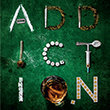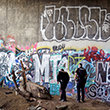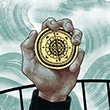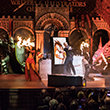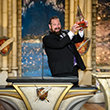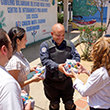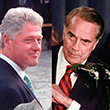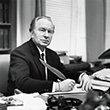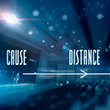
Author and Editor Mike Resnick is the top all-time winner of short fiction awards, holds the world record for Hugo Award nominations and has won five of them, so far. He has published more than 150 novels and anthologies under his editor byline, sold close to 300 short stories, and been nominated for and won science fiction awards in nearly a dozen countries.
Resnick has been a Writers of the Future Judge since 2008, has included 25 contest winners as writers in his short story collections and anthologies, and co-authored with 14 past contest winners. This year, the prolific and often self-deprecating Resnick was awarded the L. Ron Hubbard Lifetime Achievement Award. Freedom’s Michael Brennan covered the award presentation and interviewed Resnick about receiving the honor, as well as the craft and business of science fiction and fantasy writing.
Freedom: You’ve been coming to Writers of the Future week for many years—what draws you back so often?
Resnick: I keep coming back primarily because I’ve had a lot of good fortune, and you can’t pay it back, you can only pay it forward. And this is absolutely the best organization for producing new writers.
Whenever I come across a new young writer I try to get them into print. Starting in the 1990s, I bought more first stories from new writers than the three major magazines during that decade.
So how do new writers get material to you?
I tell new writers that they can only submit to me by invitation for my anthologies, that way I have to read 60 to 70 new writers a month instead of 1,000. But anyone who’s a finalist in Writers of the Future has an open invitation to submit. Probably half of the new writers I publish each year are from Writers of the Future.
You gave as much business advice to these young authors this week as you did on the craft of writing—why?
Once they’re here, they’re probably good enough to sell, so I talk about selling. An important word for young writers is “No.” You don’t have to take the first offer you get. If the story is good enough for someone to make an offer, it’s good enough for three or four or five offers.
And use social media. Participate on Facebook, participate on Twitter, get to a convention. An awful lot more of this business is done in person than by sending emails.
We’re talking about “young authors,” and some of them are. But when is it too late to be a young author?
It’s never too late. R.A. Lafferty didn’t sell his first story until he was 45, and his first novel until he was 54. (He went on to sell 29 novels and 225 short stories.)
This group of writers this year is a majority of men—with three women in the group. Is that the nature of the industry?
That used to be the case, but now that’s just the luck of the draw this time. It’s more evenly divided now, much more so.
OK, so how about some writing advice?
Put half of your work into pages one and two, because if you haven’t grabbed the slush reader by then, you’re not going to.
You better learn to budget. No one pays on time. I just got paid this week for a book I sold and got approved in November.
When I hit hard times, I write. Other writers find another way to make a buck.
I haven’t watched a TV episode since 1982. I figure it’s helped me to write an extra 40 to 45 novels.
If you don’t love it, there’s easier ways to make a living. But if you love it, do it.
Tell us about the Lara Croft book (Lara Croft Tomb Raider, The Amulet of Power).
I had a contract, they wanted me to write the book because it was tied into a game that was coming out. In the book I had to get her from Egypt to Paris. My friends call it my restaurant travelogue. Here’s a tip: if her experience in a restaurant went well, I’m recommending the restaurant. If someone tried to poison her or give her trouble, don’t eat at that place. By the end of the story, she wound up dead broke, with just enough money for breakfast in my favorite breakfast place in Paris, Angelina’s.
You’ve had quite a career. How do you feel about being given a Lifetime Achievement Award?
I’m proud of my past, but that’s the past. The novels I’m doing now and will do are the present. But these writers are the future.

